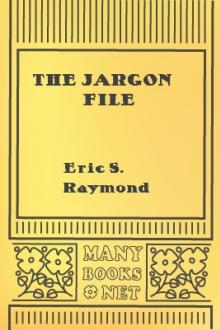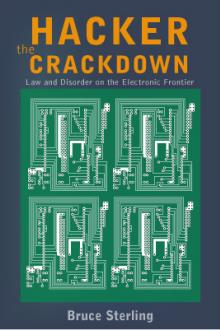The Jargon File by Eric S. Raymond (ebook reader android txt) 📕

- Author: Eric S. Raymond
- Performer: -
Book online «The Jargon File by Eric S. Raymond (ebook reader android txt) 📕». Author Eric S. Raymond
easy to comprehend from the outside. The antonym is `grungy' or
[2682]crufty. 2. v. To remove unneeded or undesired files in a effort
to reduce clutter: "I'm cleaning up my account." "I cleaned up the
garbage and now have 100 Meg free on that partition."
Node:CLM, Next:[2683]clobber, Previous:[2684]clean, Up:[2685]= C =
CLM /C-L-M/
[Sun: `Career Limiting Move'] 1. n. An action endangering one's future
prospects of getting plum projects and raises, and possibly one's job:
"His Halloween costume was a parody of his manager. He won the prize
for `best CLM'." 2. adj. Denotes extreme severity of a bug, discovered
by a customer and obviously missed earlier because of poor testing:
"That's a CLM bug!"
Node:clobber, Next:[2686]clock, Previous:[2687]CLM, Up:[2688]= C =
clobber vt.
To overwrite, usually unintentionally: "I walked off the end of the
array and clobbered the stack." Compare [2689]mung, [2690]scribble,
[2691]trash, and [2692]smash the stack.
Node:clock, Next:[2693]clocks, Previous:[2694]clobber, Up:[2695]= C =
clock
n 1. [techspeak] The master oscillator that steps a CPU or otherdigital circuit through its paces. This has nothing to do with the
time of day, although the software counter that keeps track of the
latter may be derived from the former. 2. vt. To run a CPU or other
digital circuit at a particular rate. "If you clock it at 100MHz, it
gets warm.". See [2696]overclock. 3. vt. To force a digital circuit
from one state to the next by applying a single clock pulse. "The data
must be stable 10ns before you clock the latch."
Node:clocks, Next:[2697]clone, Previous:[2698]clock, Up:[2699]= C =
clocks n.
Processor logic cycles, so called because each generally corresponds
to one clock pulse in the processor's timing. The relative execution
times of instructions on a machine are usually discussed in clocks
rather than absolute fractions of a second; one good reason for this
is that clock speeds for various models of the machine may increase as
technology improves, and it is usually the relative times one is
interested in when discussing the instruction set. Compare
[2700]cycle, [2701]jiffy.
Node:clone, Next:[2702]clone-and-hack coding, Previous:[2703]clocks,
Up:[2704]= C =
clone n.
An exact duplicate: "Our product is a clone of their product."Implies a legal reimplementation from documentation or by
reverse-engineering. Also connotes lower price. 2. A shoddy, spurious
copy: "Their product is a clone of our product." 3. A blatant ripoff,
most likely violating copyright, patent, or trade secret protections:
"Your product is a clone of my product." This use implies legal action
is pending. 4. `PC clone:' a PC-BUS/ISA or EISA-compatible 80x86-based
microcomputer (this use is sometimes spelled klone' orPClone').
These invariably have much more bang for the buck than the IBM
archetypes they resemble. 5. In the construction `Unix clone': An OS
designed to deliver a Unix-lookalike environment without Unix license
fees, or with additional `mission-critical' features such as support
for real-time programming. 6. v. To make an exact copy of something.
"Let me clone that" might mean "I want to borrow that paper so I can
make a photocopy" or "Let me get a copy of that file before you
[2705]mung it".
Node:clone-and-hack coding, Next:[2706]clover key,
Previous:[2707]clone, Up:[2708]= C =
clone-and-hack coding n.
[DEC] Syn. [2709]case and paste.
Node:clover key, Next:[2710]clue-by-four,
Previous:[2711]clone-and-hack coding, Up:[2712]= C =
clover key n.
[Mac users] See [2713]feature key.
Node:clue-by-four, Next:[2714]clustergeeking, Previous:[2715]clover
key, Up:[2716]= C =
clue-by-four
[Usenet: portmanteau, clue + two-by-four] The notional stick with
which one whacks an aggressively clueless person. This term derives
from a western American folk saying about training a mule "First, you
got to hit him with a two-by-four. That's to get his attention." The
clue-by-four is a close relative of the [2717]LART. Syn. `clue stick'.
This metaphor is commonly elaborated; your editor once heard a hacker
say "I strike you with the great sword Clue-Bringer!"
Node:clustergeeking, Next:[2718]co-lo, Previous:[2719]clue-by-four,
Up:[2720]= C =
clustergeeking /kluh'st*r-gee`king/ n.
[CMU] Spending more time at a computer cluster doing CS homework than
most people spend breathing.
Node:co-lo, Next:[2721]coaster, Previous:[2722]clustergeeking,
Up:[2723]= C =
co-lo /koh'loh`/ n.
[very common; first heard c.1995] Short for `co-location', used of a
machine you own that is physically sited on the premises of an ISP in
order to take advantage of the ISP's direct access to lots of network
bandwidthm. Often in the phrases co-lo box' orco-lo machines'.
Co-lo boxes are typically web and FTP servers remote-administered by
their owners, who may seldom or never visit the actual site.
Node:coaster, Next:[2724]COBOL, Previous:[2725]co-lo, Up:[2726]= C =
coaster n.
Unuseable CD produced during failed attempt at writing to writeableor re-writeable CD media. Certainly related to the coaster-like shape
of a CD, and the relative value of these failures. "I made a lot of
coasters before I got a good CD." 2. Useless CDs received in the mail
from the likes of AOL, MSN, CI$, Prodigy, ad nauseam.
In the U.K., `beermat' is often used in these senses.
Node:COBOL, Next:[2727]COBOL fingers, Previous:[2728]coaster,
Up:[2729]= C =
COBOL /koh'bol/ n.
[COmmon Business-Oriented Language] (Synonymous with [2730]evil.) A
weak, verbose, and flabby language used by [2731]card wallopers to do
boring mindless things on [2732]dinosaur mainframes. Hackers believe
that all COBOL programmers are [2733]suits or [2734]code grinders, and
no self-respecting hacker will ever admit to having learned the
language. Its very name is seldom uttered without ritual expressions
of disgust or horror. One popular one is Edsger W. Dijkstra's famous
observation that "The use of COBOL cripples the mind; its teaching
should, therefore, be regarded as a criminal offense." (from "Selected
Writings on Computing: A Personal Perspective") See also [2735]fear
and loathing, [2736]software rot.
Node:COBOL fingers, Next:[2737]cobweb site, Previous:[2738]COBOL,
Up:[2739]= C =
COBOL fingers /koh'bol fing'grz/ n.
Reported from Sweden, a (hypothetical) disease one might get from
coding in COBOL. The language requires code verbose beyond all reason
(see [2740]candygrammar); thus it is alleged that programming too much
in COBOL causes one's fingers to wear down to stubs by the endless
typing. "I refuse to type in all that source code again; it would give
me COBOL fingers!"
Node:cobweb site, Next:[2741]code, Previous:[2742]COBOL fingers,
Up:[2743]= C =
cobweb site n.
A World Wide Web Site that hasn't been updated so long it has
figuratively grown cobwebs.
Node:code, Next:[2744]code grinder, Previous:[2745]cobweb site,
Up:[2746]= C =
code n.
The stuff that software writers write, either in source form or after
translation by a compiler or assembler. Often used in opposition to
"data", which is the stuff that code operates on. This is a mass noun,
as in "How much code does it take to do a [2747]bubble sort?", or "The
code is loaded at the high end of RAM." Anyone referring to software
as "the software codes" is probably a [2748]newbie or a [2749]suit.
Node:code grinder, Next:[2750]code monkey, Previous:[2751]code,
Up:[2752]= C =
code grinder n.
A [2753]suit-wearing minion of the sort hired in legion strength bybanks and insurance companies to implement payroll packages in RPG and
other such unspeakable horrors. In its native habitat, the code
grinder often removes the suit jacket to reveal an underplumage
consisting of button-down shirt (starch optional) and a tie. In times
of dire stress, the sleeves (if long) may be rolled up and the tie
loosened about half an inch. It seldom helps. The [2754]code grinder's
milieu is about as far from hackerdom as one can get and still touch a
computer; the term connotes pity. See [2755]Real World, [2756]suit. 2.
Used of or to a hacker, a really serious slur on the person's creative
ability; connotes a design style characterized by primitive technique,
rule-boundedness, [2757]brute force, and utter lack of imagination.
Compare [2758]card walloper; contrast [2759]hacker, [2760]Real
Programmer.
Node:code monkey, Next:[2761]Code of the Geeks, Previous:[2762]code
grinder, Up:[2763]= C =
code monkey n
A person only capable of grinding out code, but unable to performthe higher-primate tasks of software architecture, analysis, and
design. Mildly insulting. Often applied to the most junior people on a
programming team. 2. Anyone who writes code for a living; a
programmer. 3. A self-deprecating way of denying responsibility for a
[2764]management decision, or of complaining about having to live with
such decisions. As in "Don't ask me why we need to write a compiler
in+COBOL, I'm just a code monkey."
Node:Code of the Geeks, Next:[2765]code police, Previous:[2766]code
monkey, Up:[2767]= C =
Code of the Geeks n.
see [2768]geek code.
Node:code police, Next:[2769]codes, Previous:[2770]Code of the Geeks,
Up:[2771]= C =
code police n.
[by analogy with George Orwell's `thought police'] A mythical team of
Gestapo-like storm troopers that might burst into one's office and
arrest one for violating programming style rules. May be used either
seriously, to underline a claim that a particular style violation is
dangerous, or ironically, to suggest that the practice under
discussion is condemned mainly by anal-retentive [2772]weenies. "Dike
out that goto or the code police will get you!" The ironic usage is
perhaps more common.
Node:codes, Next:[2773]codewalker, Previous:[2774]code police,
Up:[2775]= C =
codes n.
[scientific computing] Programs. This usage is common in people who
hack supercomputers and heavy-duty [2776]number-crunching, rare to
unknown elsewhere (if you say "codes" to hackers outside scientific
computing, their first association is likely to be "and cyphers").
Node:codewalker, Next:[2777]coefficient of X, Previous:[2778]codes,
Up:[2779]= C =
codewalker n.
A program component that traverses other programs for a living.
Compilers have codewalkers in their front ends; so do cross-reference
generators and some database front ends. Other utility programs that
try to do too much with source code may turn into codewalkers. As in
"This new vgrind feature would require a codewalker to implement."
Node:coefficient of X, Next:[2780]cokebottle,
Previous:[2781]codewalker, Up:[2782]= C =
coefficient of X n.
Hackish speech makes heavy use of pseudo-mathematical metaphors. Four
particularly important ones involve the terms coefficient',factor',
index of X', andquotient'. They are often loosely applied to things
you cannot really be quantitative about, but there are subtle
distinctions among them that convey information about the way the
speaker mentally models whatever he or she is describing.
Foo factor' andfoo quotient' tend to describe something for which
the issue is one of presence or absence. The canonical example is
[2783]fudge factor. It's not important how much you're fudging; the
term simply acknowledges that some fudging is needed. You might talk
of liking a movie for its silliness factor. Quotient tends to imply
that the property is a ratio of two opposing factors: "I would have
won except for my luck quotient." This could also be "I would have won
except for the luck factor", but using quotient emphasizes that it was
bad luck overpowering good luck (or someone else's good luck
overpowering your own).
Foo index' andcoefficient of foo' both tend to imply that foo is,
if not strictly measurable, at least something that can be larger or
smaller. Thus, you might refer to a paper or person as having a `high
bogosity index', whereas you would be less likely to speak of a `high
bogosity factor'. `Foo index' suggests that foo is a condensation of
many quantities, as in the mundane cost-of-living index; `coefficient
of foo' suggests that foo is a fundamental quantity, as in a
coefficient of friction. The choice between these terms is often one
of personal preference; e.g., some people might feel that bogosity is
a fundamental attribute and thus say `coefficient of bogosity',
whereas others might feel it is a combination of factors and thus say
`bogosity index'.
Node:cokebottle, Next:[2784]cold boot, Previous:[2785]coefficient of
X, Up:[2786]= C =
cokebottle /kohk'bot-l/ n.
Any very unusual character, particularly one you can't type because it
isn't on your keyboard. MIT people used to complain about the
`control-meta-cokebottle' commands at SAIL, and SAIL people complained
right back about the `escape-escape-cokebottle' commands at MIT. After
the demise of the [2787]space-cadet keyboard, `cokebottle' faded away
as serious usage, but was often invoked humorously to describe an
(unspecified) weird or non-intuitive keystroke command. It may be due





Comments (0)